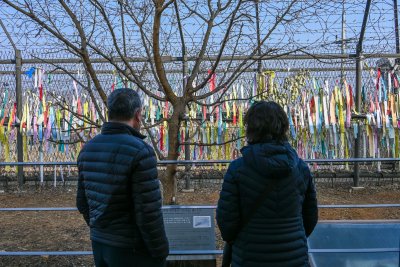
SEOUL, Oct. 20 (UPI) — Fewer South Koreans than ever say their country should reunify with North Korea, according to a new survey released Monday, reflecting a growing acceptance of permanent division and deepening public indifference toward the North.
Just 49% of South Koreans said unification is necessary, the survey by the government-funded Korea Institute for National Unification found. The figure represents a drop of 3.8% from last year and marks the lowest level since the Seoul-based think tank began its annual poll in 2014.
It is the first time support has fallen below a majority, representing what researchers called a “structural shift” in how South Koreans view the decades-old goal of national reunification.
“These results suggest that perceptions of the necessity of unification have entered a phase of structural change, rather than short-term fluctuation,” the report’s executive summary said. “The decline appears to reflect the compounded effects of North Korea’s hostile ‘two-states’ claim, the continued suspension of inter-Korean relations and domestic political dynamics.”
KINU noted that the decline cuts across all age groups but is most pronounced among younger generations, many of whom see North Korea as a separate state rather than part of a divided homeland.
Some 63.2% of respondents said unification was not needed if the two Koreas could maintain peaceful coexistence, the highest level recorded since the question was introduced nine years ago. At the same time, 47% agreed that “it is better to stay divided as we are now,” reflecting what KINU described as a normalization of both peaceful and “hostile” coexistence.
“The rising preference for hostile coexistence does not indicate a desire for conflict but rather a psychological inclination to maintain the status quo in the face of uncertain change,” the report said.
The survey also found indifference toward North Korea at a record high, with 68% of respondents saying they had little or no interest in the North, up sharply from about 51% in 2015. The trend has persisted regardless of political ideology or shifts in inter-Korean ties, KINU said.
South Koreans still favor limited engagement, however. Nearly 70% backed sports and cultural exchanges with the North, and 54% supported continued economic cooperation even during political tensions. Support for another inter-Korean summit remained high at 69%, including a majority of conservatives.
Support for humanitarian aid took a negative turn this year, with 39.5% against compared to 36.8% in favor — a shift that KINU linked to perceptions that North Korea’s economic conditions have improved amid strengthening ties with Russia and China.
The administration of South Korean President Lee Jae Myung has made efforts to rehabilitate relations between the two Koreas since he took office in June, with conciliatory gestures such as removing propaganda loudspeakers from border areas.
Last week, Seoul resumed an excavation project for the remains of soldiers killed in the Korean War at a battle site near the inter-Korean border, in what the military called “a practical measure to transform the DMZ into a zone of peace.”
Pyongyang, however, continues to reject Seoul’s diplomatic gestures while advancing its nuclear weapons program.
The 2025 KINU survey was conducted July 10 to Aug. 13 through face-to-face interviews with 1,000 adults.